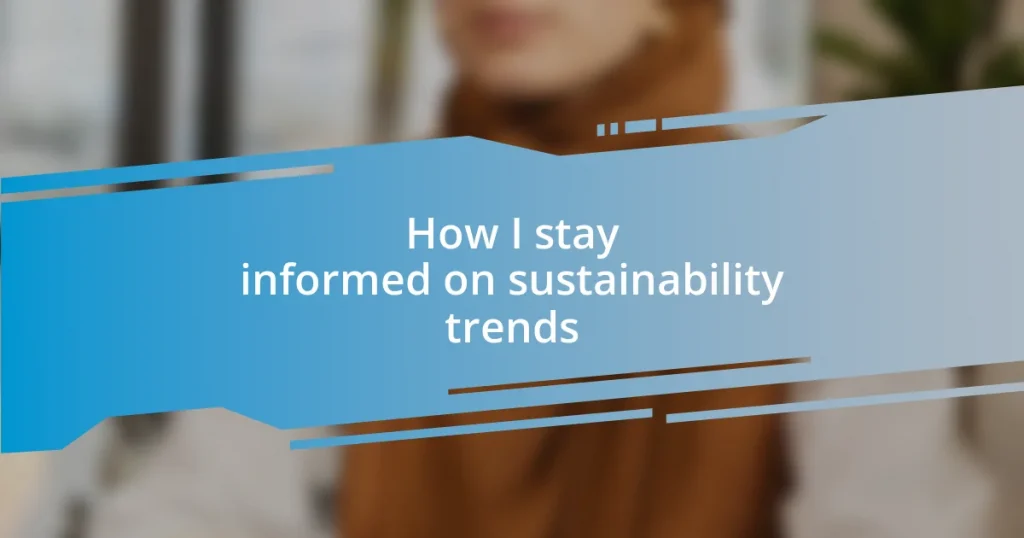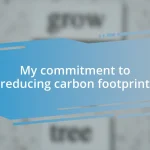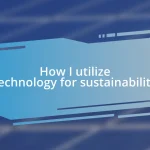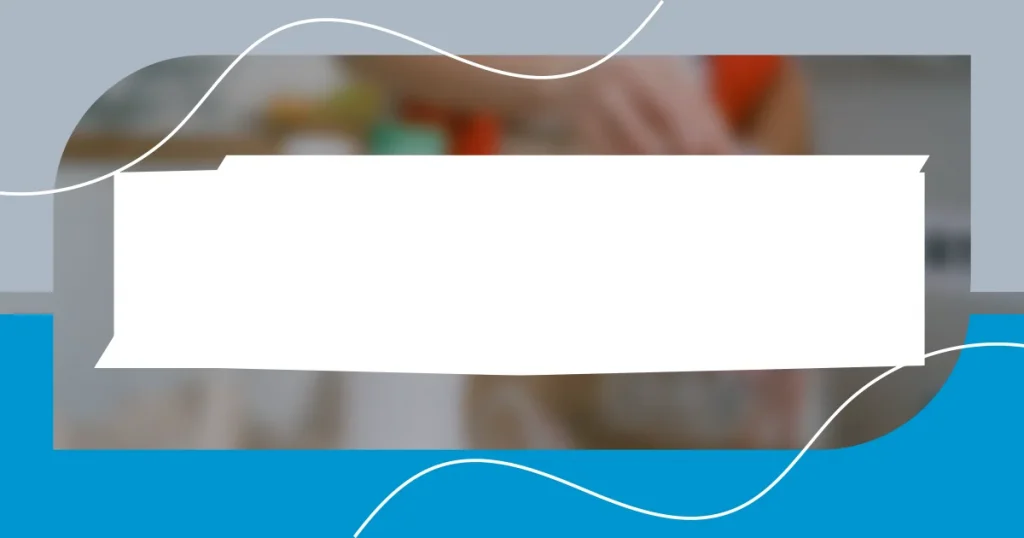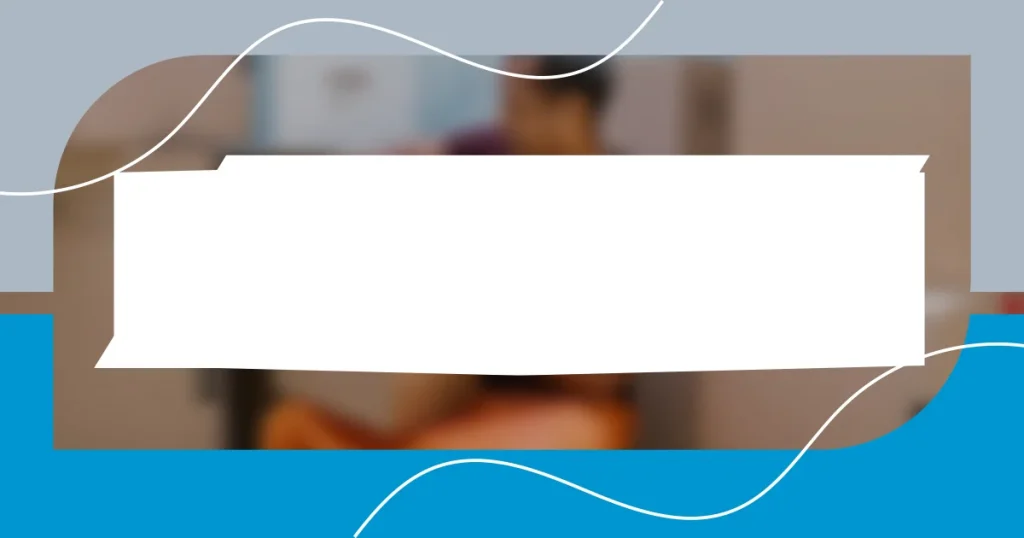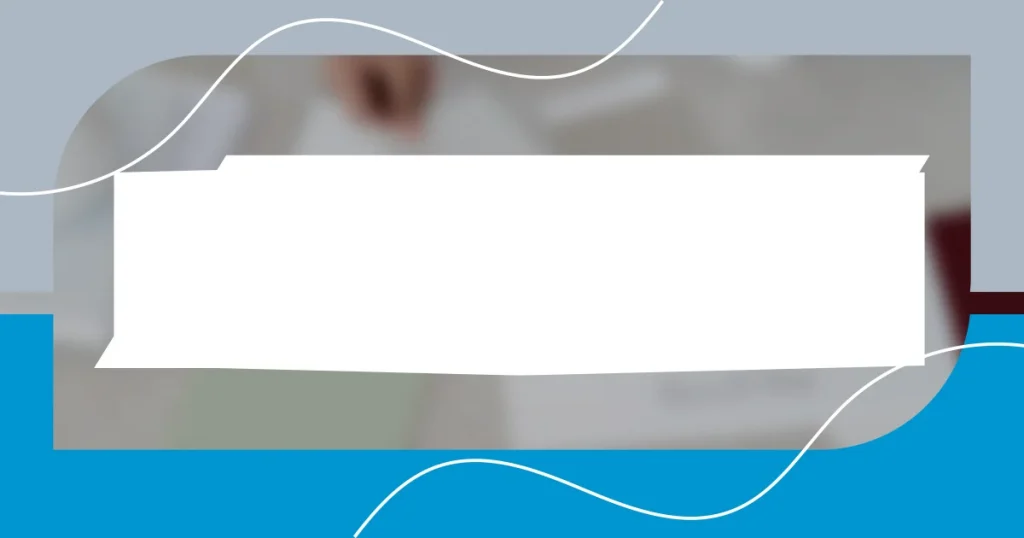Key takeaways:
- Identifying reliable sustainability sources involves seeking out established organizations, peer-reviewed journals, and engaging with online communities for credible information.
- Subscribing to newsletters enhances access to curated content and timely alerts, fostering a more rounded understanding of diverse sustainability topics.
- Networking with sustainability professionals leads to valuable discussions, collaborations, and practical actions that contribute to community engagement and personal growth in sustainable practices.
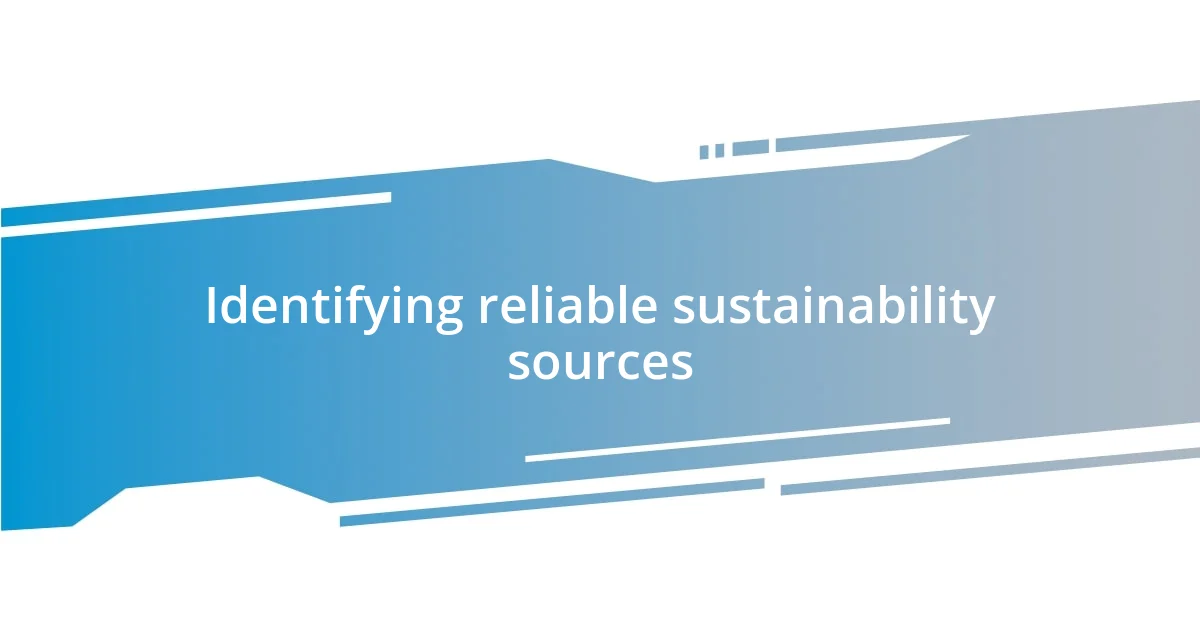
Identifying reliable sustainability sources
Identifying reliable sustainability sources can sometimes feel overwhelming, especially with the vast amount of information out there. I remember when I first dove into this world; I was bombarded with articles, blogs, and statistics, and it was tough to know who to trust. What helped me was seeking out well-established organizations, like the World Wildlife Fund or the Environmental Protection Agency, which offer credible information and insights.
I also find it beneficial to look for peer-reviewed journals and publications focusing on sustainability research. I recall an eye-opening experience when I stumbled upon an article that changed my perspective on renewable energy. The thoroughness of the research reassured me that I was on the right path. Have you ever come across a study that made you rethink your assumptions? I certainly have, and it reinforced my belief in the importance of sourcing high-quality information.
Engaging with online communities and forums can be another excellent way to identify reliable sources. When I joined a local sustainability group, I gained access to recommendations and discussions that pointed me towards trustworthy resources. It felt empowering to connect with like-minded individuals who shared their insights and experiences. Have you thought about tapping into such communities? They can open up new avenues for learning and understanding sustainability trends.
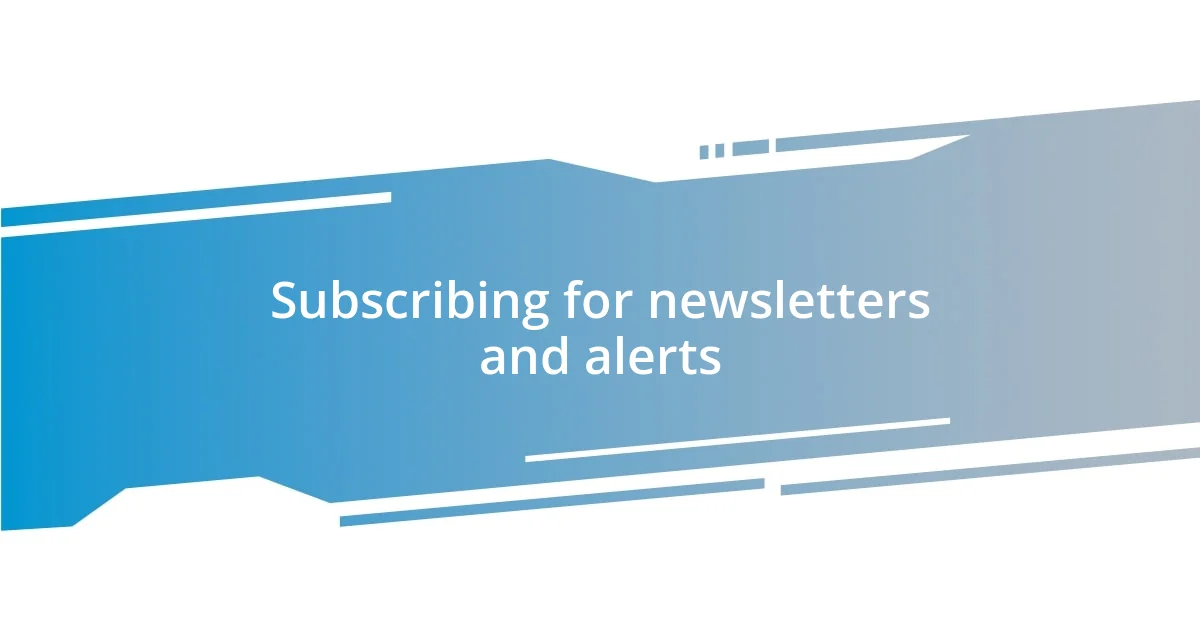
Subscribing for newsletters and alerts
Subscribing to newsletters and alerts has been a game-changer for me in staying updated on sustainability trends. When I first started, I found it overwhelming to sift through endless articles. But by subscribing to newsletters from credible organizations, I now receive curated content that’s tailored to my interests straight into my inbox. It’s as if I have a personal assistant helping me navigate through the noise of information!
In my experience, timely alerts can make a significant difference. For instance, I once received an alert about a new sustainable packaging initiative that prompted me to rethink my own shopping habits. The instant access to the latest innovations makes staying informed feel less like a chore and more like an exciting journey. Have you ever experienced the thrill of suddenly learning something new that made you change your perspective? For me, those moments are priceless and keep me engaged in the sustainability conversation.
Moreover, the diversity of content from different newsletters enriches my understanding. I enjoy how some newsletters focus on grassroots movements, while others dive into corporate sustainability efforts. This variety gives me a more rounded view of the field. I remember a particular newsletter featuring success stories from around the globe—each story motivated me and confirmed that sustainable choices are indeed possible and impactful. Wouldn’t you agree that hearing success stories can reignite your passion for sustainability?
| Newsletter Source | Focus Area |
|---|---|
| World Wildlife Fund | Conservation Strategies |
| Environmental Protection Agency | Regulatory Updates |
| Sustainable Development Solutions Network | Global Innovations |
| GreenBiz | Corporate Sustainability Trends |
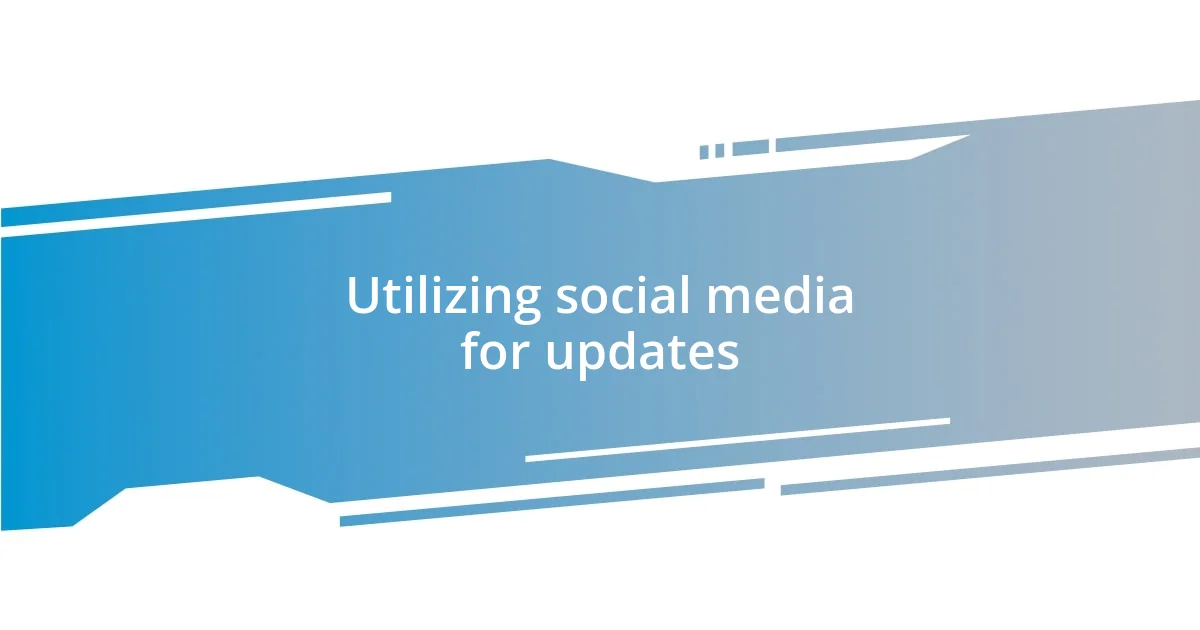
Utilizing social media for updates
Utilizing social media for updates has transformed the way I stay informed about sustainability trends. Initially, I didn’t realize the power of platforms like Twitter and Instagram, but once I started following experts and organizations, I discovered a wealth of real-time updates and discussions. It feels almost like being in a bustling marketplace of ideas, where every post invites exploration and engagement. I’ve often found myself captivated by infographics and short videos that succinctly explain complex concepts, making sustainability both accessible and exciting.
When curating my social media feed, I focus on connecting with credible voices. Here’s a quick list of strategies that I use to keep my updates informative and relevant:
- Follow renowned sustainability influencers and activists for diverse perspectives.
- Engage with organizations like Greenpeace and the UN Environment Programme that frequently share actionable insights.
- Join Facebook groups or LinkedIn communities focused on sustainability for collective knowledge sharing.
- Use specific hashtags like #SustainableLiving or #EcoFriendly to discover trending topics and discussions.
- Participate in Twitter chats to connect directly with experts and share experiences.
Each of these strategies enriches my understanding and keeps the conversation lively. A recent post from a friend who attended a sustainability summit inspired me to explore alternative energy in ways I hadn’t considered before. The emotional pull of seeing real people passionately advocating for change can ignite a fire within us all to act sustainably. Have you found social media to be a game-changer in your own journey of staying informed?
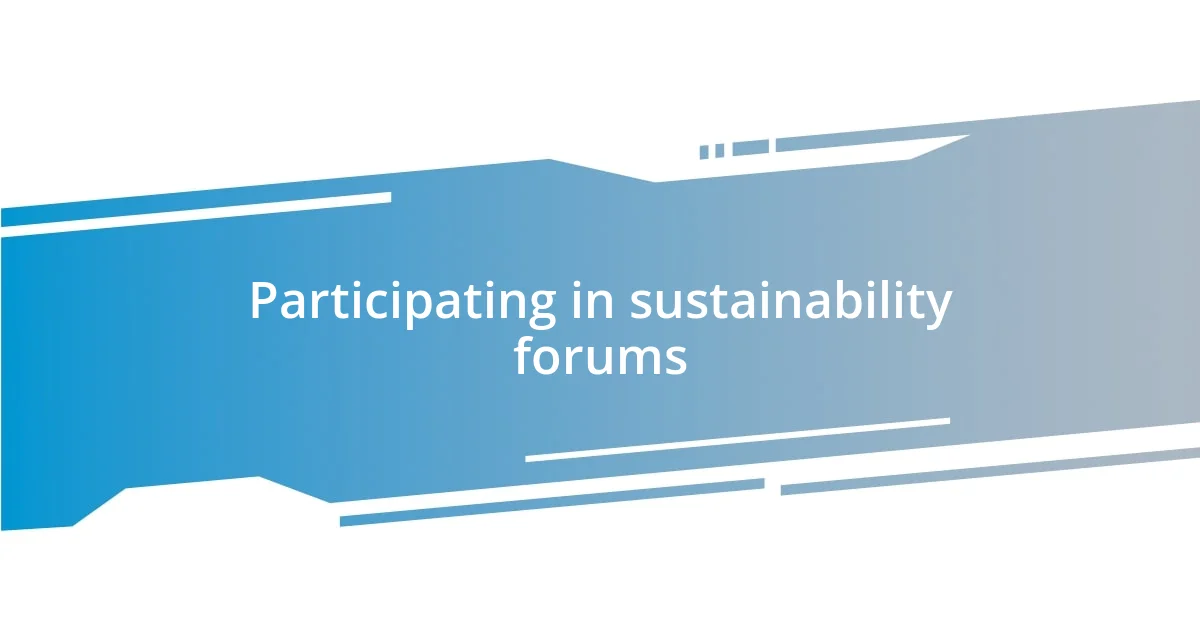
Participating in sustainability forums
Participating in sustainability forums has been an enlightening experience for me. Initially, I was hesitant; I feared I wouldn’t have anything valuable to contribute. However, I quickly discovered that I wasn’t just there to share my thoughts but to learn from others’ experiences. The wealth of knowledge shared in these forums is incredible! Whether it’s a question about zero-waste living or a discussion on renewable energy policies, I’ve found diverse opinions that broaden my understanding of sustainability.
One memorable instance was when I joined a forum discussing local community gardens. As I engaged in conversations about urban farming, I felt a deeper connection to my community while discovering practical tips to start my own garden. It’s the shared enthusiasm and the feeling of camaraderie that keeps me coming back. Have you ever experienced a sense of belonging in a space where everyone shares a common interest? That’s what sustainability forums provide—a supportive environment where everyone can grow their ideas and knowledge together.
I also appreciate the dynamic nature of these discussions; they reflect the rapidly changing landscape of sustainability. For example, a recent thread about the impact of fast fashion on the environment made me rethink my own clothing choices. Reading personal stories of people who made drastic changes inspired me to make small shifts in my shopping habits. The real-world implications of these discussions resonate deeply with me. How often do we get the chance to not only learn but also apply that knowledge to our lives? Participating in such forums ensures that I don’t just stay informed but actively engage in my sustainability journey.
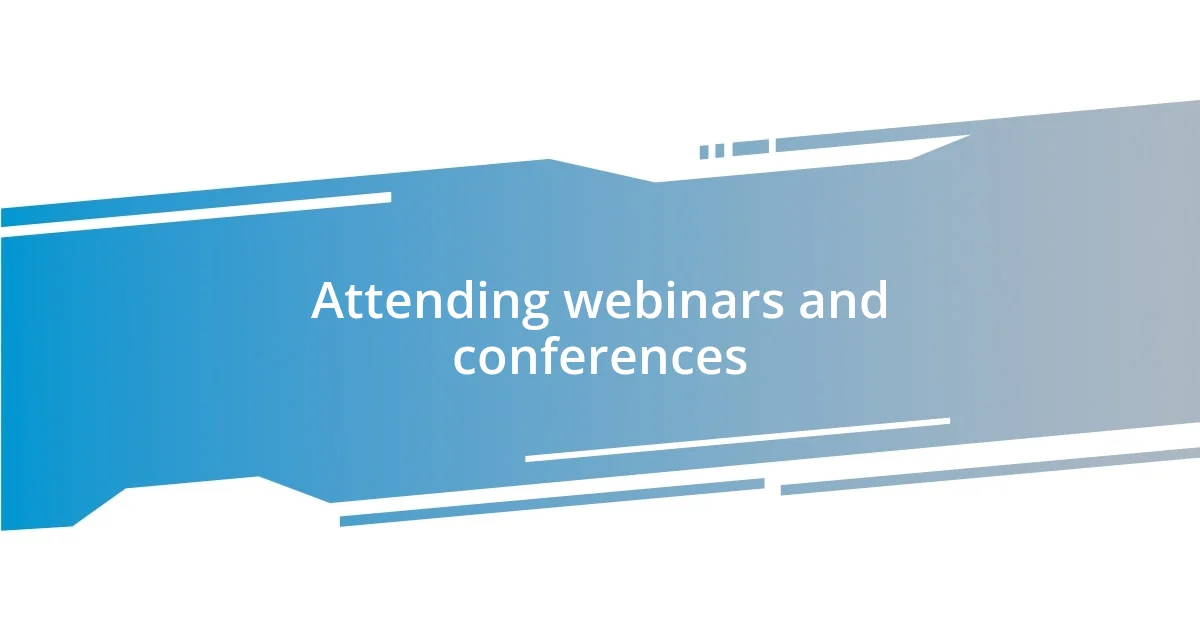
Attending webinars and conferences
Attending webinars and conferences is one of the most effective ways I stay connected with the latest in sustainability. There’s something electrifying about tuning into a live discussion where thought leaders share groundbreaking ideas. I still remember my first virtual conference on eco-innovation; the enthusiasm of the speakers was infectious! They sparked my curiosity about solutions I had never considered, like biophilic design, which promotes incorporating nature into architecture. Have you ever felt like you were on the cusp of a significant revelation just by listening to someone share their knowledge?
I find the interactive element of these events especially valuable. During a recent webinar, I had the opportunity to engage directly with a panel of experts. I asked a question about corporate responsibility in the fashion industry, and to my surprise, one of the speakers took the time to craft a thoughtful response tailored to my inquiry. It felt wonderful to have my voice heard in a space where so many are passionate about driving change. Engaging in real-time discussions elevates the experience from mere observation to active participation.
Moreover, these events create a sense of community among participants. After a sustainability conference, I connected with several attendees on social media, and we formed a small group for ongoing discussions. Sharing resources and continuing conversations beyond the event has enriched my understanding of complex sustainability issues. Does this happen to you too? Finding like-minded individuals in a community can turn initial insights into lasting collaborations that can push us all further along our sustainability journeys.
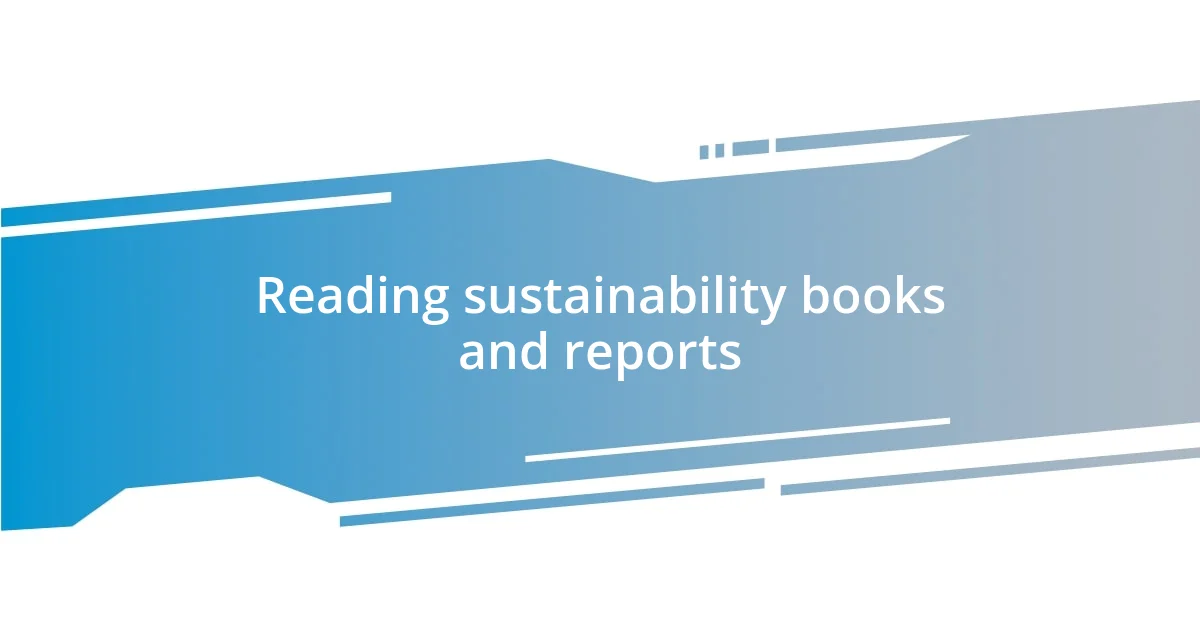
Reading sustainability books and reports
Reading sustainability books and reports is a cornerstone of my journey toward being well-informed and conscious in my lifestyle choices. I often curl up with a good book like “This Changes Everything” by Naomi Klein, which masterfully blends compelling storytelling with rigorous analysis. The moment I finished that book, I felt a mix of empowerment and urgency—I realized how interconnected our environmental struggles really are. Have you ever read something that spurred you to take action? That’s the power of a well-written sustainability book!
Reports, on the other hand, provide a different kind of insight. I regularly immerse myself in publications from organizations like the World Resources Institute. Their data-driven approaches offer a comprehensive look at pressing environmental issues. Just the other day, while reviewing a report on global plastic pollution, I was struck by the statistics—it made me reflect on how my small choices, like opting for reusable bottles, contribute to the larger picture. When I analyze hard facts backed by research, it often compels me to adjust my habits. Isn’t it fascinating how information can reshape our behaviors and attitudes?
Combining both books and reports allows me to see the full spectrum of sustainability. For instance, after digesting a latest report on renewable energy progress, I picked up a book that discussed the grassroots movements pushing for change. I found that the stories of real people making a difference complemented the statistics beautifully. It’s this harmonious blend of quantitative data and qualitative narratives that continually motivates me. Isn’t it wonderful how reading can deepen our understanding and ignite our passion for sustainability? Through every page turned, I feel more equipped to make a positive impact.
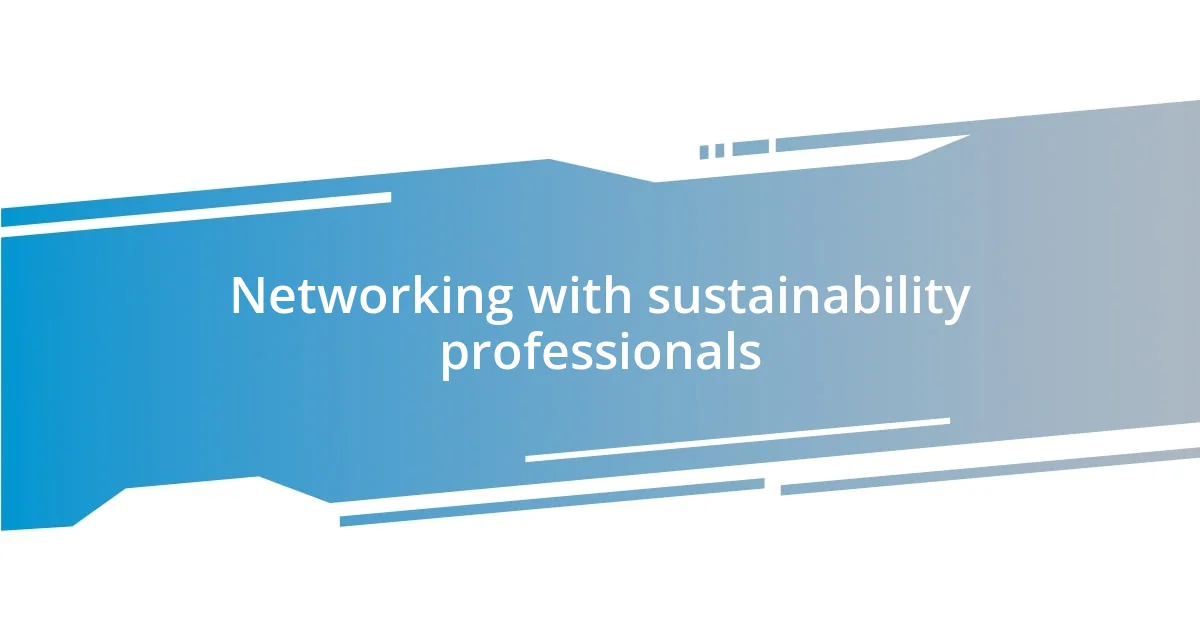
Networking with sustainability professionals
Building connections with sustainability professionals is an invaluable aspect of my learning process. I recall attending a local meetup where I struck up a conversation with a sustainability consultant. We shared perspectives on sustainable agriculture, and I left that evening energized by the wealth of knowledge I gained. Have you experienced that spark of inspiration from a simple chat with someone in your field? I find that these informal interactions often lead to rich discussions and valuable insights that you simply can’t get from reading alone.
I also make it a point to utilize platforms like LinkedIn to connect with like-minded professionals. One day, I came across a post about a new eco-friendly initiative, and I took a chance by commenting on it. A conversation unfolded, and before I knew it, I was invited to join a virtual roundtable discussion. Engaging with fellow sustainability advocates online empowers me to stay updated on trending topics and innovative practices. It’s amazing how a single interaction can lead to new opportunities for collaboration and knowledge-sharing—have you found similar connections in your own network?
Networking in this space often leads to collaborative projects that extend beyond the initial conversation. Last year, I teamed up with a few professionals I met through a sustainability forum to organize a community clean-up event. The experience was eye-opening; not only did we tackle immediate environmental concerns together, but I also forged friendships that continue to flourish. Reflecting on this, I can’t help but wonder: how often do we miss out on potential projects simply because we don’t reach out? Building a network not only expands our knowledge but also compels us to take practical actions that can make a real difference.











